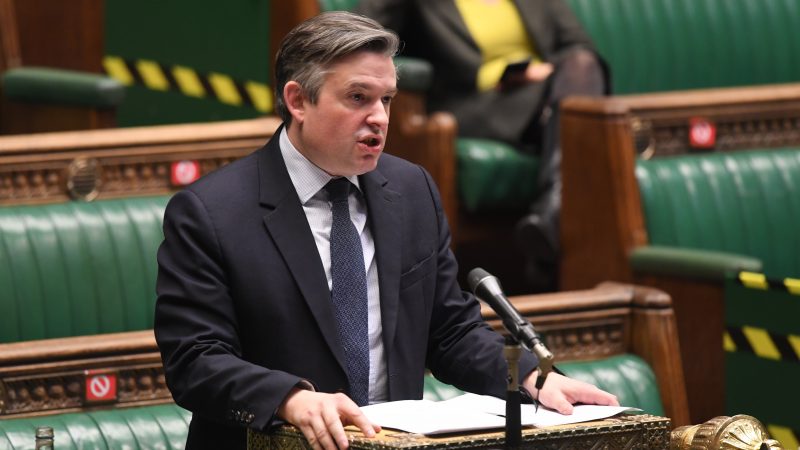
Labour’s Jonathan Ashworth has criticised the government for leaving “a gaping hole in our defences” during the coronavirus pandemic following a damning report on failures in England’s contact tracing system.
A new report by the National Audit Office found that ‘NHS Test and Trace’ had failed to deliver enough Covid-19 test results within 24 hours and did not plan for a sharp rise in testing demand when schools and universities reopened.
The financial watchdog added that some parts of the contact tracing service had been “barely used”, with some call handlers working just 1% of their paid hours during several months from the start of the pandemic.
Commenting on the report, Labour’s Shadow Health Secretary said: “The £22bn Test and Trace now has a budget larger than policing and fire service combined, but it has failed to trace sufficient numbers of contacts and ensure those who are contacted are able to isolate.
“Instead of handing multi-million pound contracts to big private outsourcing firms the government should have invested in local, experienced public health expertise. The government’s failure on test and trace continues to leave us with a gaping hole in our defences.”
According to the NAO report, some call handlers were busy for less than half of their working hours throughout September and for much of October, despite efforts to reduce excess capacity in the system and introduce more flexible hours.
NAO chief Gareth Davies concluded that the £22bn system needed to improve its performance “with a focus on effective engagement with the public and integration with local efforts to improve tracing”.
Davies said: “The government has rapidly increased testing and tracing activity, building significant new infrastructure and capacity from scratch. However, it has struggled to test and trace as many people as it has capacity to, or to reach the contacts of people testing positive quickly enough.”
The NAO intends to publish a further report in spring 2021 that will provide a fuller assessment of value for money for the service and look in detail at the development of the government’s contact tracing app.
The report, published on Friday, noted that “a range of stakeholders” had questioned why local authorities were not directly involved in the contact tracing system from the outset “given their existing experience of this activity”.
NAO officials said they had not seen evidence to show that the government considered using local authorities for call handling before it decided to use the private sector to expand contract tracing capacity.
“As with many other government procurements during the pandemic, 70% of early contracts by value were assigned as direct awards without competition under emergency measures,” the report stated.
“[Test and Trace] told us that, given the need to scale up operations at speed, it had to use the private sector to respond quickly, for example in expanding the diagnostic industry and to employ a large number of central contact tracers.”
In October, Labour called on the government to “ditch Serco” – one of two private firms hired to help run the tracing system – and put contact tracing in the hands of councils and local public health teams.
At the time, Labour’s Rachel Reeves said: “For months, Labour has been asking this government to put contact tracing into the hands of councils and local public health teams who know their own communities better than anyone.
“In the face of all the evidence, the Tories are continuing with a system that rewards failure by handing enormous sums of money to big companies such as Serco and Sitel.”
She added: “This approach has defied the experience around the world, left underfunded public services to clear up the mess days later and made our communities vulnerable to rising infection rates.”




More from LabourList
‘Labour won’t stop the far right by changing leaders — only by proving what the left can deliver’
‘Cutting Welsh university funding would be economic vandalism, not reform’
Sadiq Khan signals he will stand for a fourth term as London Mayor